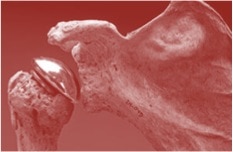Do we know Shoulder Replacement Works?
Shoulder replacement is a tough surgery sometimes recommended when the shoulder is chronically painful due to severe arthritis. I remember back in residency learning that patients with shoulder replacement had a much more protracted recovery and were often left with continued pain despite the invasive surgery. The reason given then is still the same, the shoulder is a complex joint with many directions of movement, so unlike replacing a hip with a deep ball and socket joint, replacing a shoulder is different. The shoulder socket is shallow, so keeping the ball of the shoulder in it’s socket is largely accomplished by muscles. The trauma from the invasive surgical implant of the new joint and the long-term recovery time from shoulder replacement surgery often causes these stabilizing muscles to atrophy, leaving the remaining joint weak. You might think that with all of the big resources poured into shoulder replacement joints we would have good research showing that replacing the shoulder is better than not replacing the shoulder. However, no such data exists according to a recent study looking at research in this area. This review of many published studies concluded that we really didn’t know if shoulder replacement was better than leaving the shoulder alone and recommended more research. More recently, “resurfacing” or a “Birmingham” shoulder replacement has been all the rage, but these minimal shoulder replacements have problems related to their metal content. These smaller prostheses such as the metal on metal (MOM) type have well documented safety issues. In fact, these MOM joints were the target of several negative studies at the recent AAOS meeting where researchers demonstrated severe adverse health effects in some patients from wear particles released by the metal. If replacing the joint isn’t a good option, what else might work to help treat the pain of shoulder osteoarthritis? A small pilot study shows that two injections of hyaluronic acid (aka HA or artificial lubricants like SynVisc, OrthoVisc, Supartz, Hyalgan, etc…) helped most patients get by with less pain and increased function. Injecting steroid medications into peripheral joints like the shoulder can help short-term, but these injections don’t offer as much prolonged relief as HA injections. This longer term effect of HA injections was also echoed by a larger study that compared HA to steroids for hand arthritis. There are also other reasons to be wary of steroid injections in joints, as the combination of anesthetic and steroid commonly used by many physicians can kill off remaining cartilage cells. We’ve also seen good results with the injection of the patient’s own stem cells to treat shoulder arthritis. This procedure may be regenerative in that it may help the cartilage in the joint. The upshot? Until we have better data, you may want to stay away from invasive shoulder replacement surgery and consider looking at non-surgical options like hyaluronic acid injections or cell based therapy.

If you have questions or comments about this blog post, please email us at [email protected]
NOTE: This blog post provides general information to help the reader better understand regenerative medicine, musculoskeletal health, and related subjects. All content provided in this blog, website, or any linked materials, including text, graphics, images, patient profiles, outcomes, and information, are not intended and should not be considered or used as a substitute for medical advice, diagnosis, or treatment. Please always consult with a professional and certified healthcare provider to discuss if a treatment is right for you.
